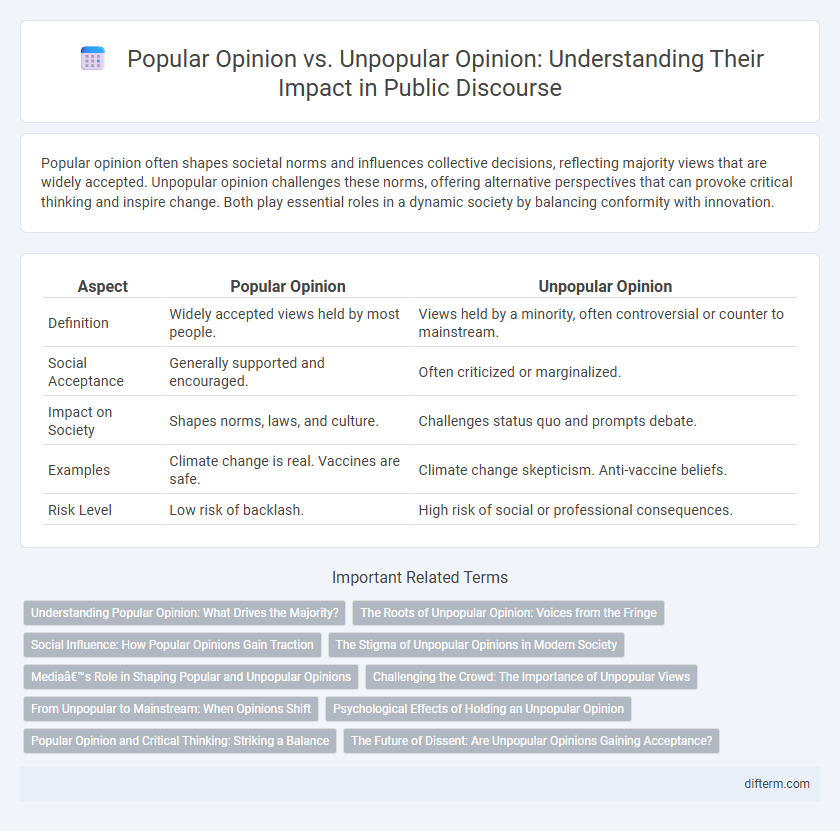Popular opinion often shapes societal norms and influences collective decisions, reflecting majority views that are widely accepted. Unpopular opinion challenges these norms, offering alternative perspectives that can provoke critical thinking and inspire change. Both play essential roles in a dynamic society by balancing conformity with innovation.
Table of Comparison
| Aspect | Popular Opinion | Unpopular Opinion |
|---|---|---|
| Definition | Widely accepted views held by most people. | Views held by a minority, often controversial or counter to mainstream. |
| Social Acceptance | Generally supported and encouraged. | Often criticized or marginalized. |
| Impact on Society | Shapes norms, laws, and culture. | Challenges status quo and prompts debate. |
| Examples | Climate change is real. Vaccines are safe. | Climate change skepticism. Anti-vaccine beliefs. |
| Risk Level | Low risk of backlash. | High risk of social or professional consequences. |
Understanding Popular Opinion: What Drives the Majority?
Popular opinion often reflects prevailing societal values, cultural norms, and collective experiences that resonate with the majority's identity and priorities. Social influence, media framing, and widespread communication channels play crucial roles in shaping and reinforcing these dominant perspectives. Understanding what drives popular opinion requires analyzing factors like emotional appeal, repetition, and perceived consensus within influential groups.
The Roots of Unpopular Opinion: Voices from the Fringe
Unpopular opinions often emerge from marginalized groups whose experiences and perspectives diverge from mainstream narratives, challenging societal norms and prompting critical reflection. These voices from the fringe provide vital insights that question dominant ideologies and foster cultural diversity, despite facing resistance or dismissal. Understanding the roots of unpopular opinions reveals underlying social dynamics and power structures that shape public discourse.
Social Influence: How Popular Opinions Gain Traction
Popular opinions gain traction through widespread social influence mechanisms such as conformity, social validation, and the bandwagon effect, which encourage individuals to adopt views perceived as mainstream. Mass media, influential figures, and online platforms amplify these opinions by creating a sense of consensus and normality. In contrast, unpopular opinions struggle to gain recognition due to social resistance and fear of ostracism, limiting their visibility and acceptance.
The Stigma of Unpopular Opinions in Modern Society
Unpopular opinions often face harsh stigma in modern society, where social conformity and the influence of mass media shape collective beliefs. Individuals expressing these views risk social alienation, censorship, or online harassment, highlighting the fragile tolerance for dissent outside mainstream narratives. This climate discourages open discourse and critical thinking, impeding societal progress and the evolution of diverse perspectives.
Media’s Role in Shaping Popular and Unpopular Opinions
Media significantly influences the formation of popular and unpopular opinions by controlling information flow and framing narratives that resonate with or challenge public sentiment. Algorithms on social platforms amplify dominant viewpoints while marginalizing dissenting voices, thereby shaping societal perceptions. This selective exposure creates echo chambers that both reinforce popular opinions and polarize unpopular perspectives, affecting public discourse and social dynamics.
Challenging the Crowd: The Importance of Unpopular Views
Unpopular opinions play a crucial role in driving social progress by challenging the prevailing narratives held by the majority. Embracing diverse perspectives encourages critical thinking and innovation, preventing stagnation within cultural and intellectual landscapes. Suppressing unpopular views often leads to groupthink, undermining the evolution of ideas essential for a resilient society.
From Unpopular to Mainstream: When Opinions Shift
Shifts from unpopular to mainstream opinions often reflect evolving social values and increased awareness of previously marginalized perspectives. Cultural movements and influential thought leaders play critical roles in transforming controversial ideas into widely accepted norms. This dynamic process highlights the fluid nature of societal consensus and the power of persistent advocacy.
Psychological Effects of Holding an Unpopular Opinion
Holding an unpopular opinion often triggers cognitive dissonance, leading to increased stress and social anxiety due to perceived rejection or isolation. Studies show that individuals with dissenting views experience heightened neural activity in areas related to pain and distress, reflecting the psychological burden of social exclusion. Despite the discomfort, maintaining such opinions can strengthen personal identity and resilience by fostering critical thinking and self-validation.
Popular Opinion and Critical Thinking: Striking a Balance
Popular opinion often reflects collective beliefs shaped by social norms, yet relying solely on it can hinder critical thinking and individual judgment. Balancing popular opinion with critical analysis encourages assessing information objectively and questioning prevailing views for more nuanced conclusions. Cultivating this balance fosters intellectual independence while remaining aware of societal influences on perception.
The Future of Dissent: Are Unpopular Opinions Gaining Acceptance?
Unpopular opinions are increasingly gaining acceptance as digital platforms amplify diverse voices and challenge traditional norms. The rise of social media has created spaces where dissenting views can reach wider audiences, fostering more open and inclusive public discourse. This shift suggests a future where the boundary between popular and unpopular opinions becomes more fluid, encouraging critical thinking and societal progress.
Popular opinion vs Unpopular opinion Infographic

 difterm.com
difterm.com